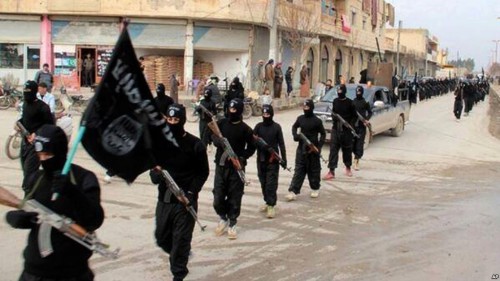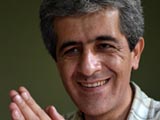An Exceptional Opportunity
by Yaghoub Yadali and translated by Parvaneh Torkamani / June 27, 2014 / No comments
The current threat of ISIS in Iraq could result in positive relations between the US and Iran.

Members of the Islamic State of Iraq and Syria marching in Syria Photo: Creative Commons via Voice of America
In the past thirty-five years, Iran and the United States have agreed on very few political issues. In the early 2000s the countries were drawn together to destroy a common enemy, the Afghani Taliban . Granted, at that time, the hope that the countries’ common disdain for the Taliban would lead them into cooperation ended in disappointment. However, these days a new common enemy has aligned Iranian and US interests.

- “Enemy…terrorism…nuclear bomb…war.” These words are often used by American media to describe Iran. The image the media presents is often hazy, incomplete, and distorted. The political and military aspects of my country are covered mainly in a negative light.
- In Under Eastern Eyes (I have adopted the name from the novel Under Western Eyes by Joseph Conrad), I will write about those topics which American media either cannot or does not want to talk about. The emphasis will be on social and cultural aspects of Iran although, out of necessity, I will talk about politics, despite my despair.

- Yaghoub Yadali, born in 1970, is a writer and television director. His first work of fiction, the short-story collection Sketches in the Garden, was published in 1997. It was followed in 2001 by Probability of Merriment and Mooning, which was named book of the year by the Writers and Critics Award. His first novel, The Rituals of Restlessness, won the 2004 Golshiri Foundation Award for the best novel of the year and was named as one of the ten best novels of the decade by the Press Critics Award. He has also published many articles and reviews of literature and cinema in newspapers and magazines in Iran.
Earlier this month, an extremist group known as the Islamic State in Iraq and Greater Syria (ISIS), captured several Iraqi cities, including Mosul, the country’s third largest city. The group’s final goal is to establish an extremist Islamic government in both Iraq and Syria. ISIS’s savage exploits have resulted in outcry from the international community and even Al Qaeda has announced a lack of affiliation with the group’s extremist politics.
Iranian President Hassan Rouhani has said that he does not support US involvement in Iraq, but if the US complies with Iranian wishes Iran is willing to cooperate in the dismantling of ISIS in Iraq. Meanwhile, Secretary of State John Kerry has announced that the US is willing to negotiate with Iran on the issue. Factions in both Iran and the US would like an agreement to be met in order to unite the countries but, to a great extent, this plea has been silenced.
The conversation about ISIS is taking place alongside negotiations concerning Iran’s nuclear program . These negotiations have led to a six-month agreement between the two countries, but a permanent alliance has yet to be made.
It’s as though years of mistrust between Iran and the United States have culminated in an exceptional opportunity that, if approached wisely, could resolve some of the problems between the two countries. If Iran and the United States reach a permanent, comprehensive agreement about either the nuclear program or ISIS, it’s possible that the path will present itself for negotiation on other topics, thus sparking a sustained relationship between the two countries. Otherwise, activists and sensible politicians in both nations will be forced to continue waiting for another favorable opportunity to mend Iranian/US relations. However, the past fifteen years has taught us that this opportunity is likely to come in the form of other extremist groups posing a threat to Iranian and US interests.




